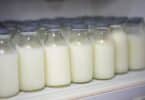Breastfeeding is acknowledged to be the best choice for babies, but new research presented at the annual scientific meeting of the American College of Allergy, Asthma and Immunology reports that it doesn’t prevent allergies.
Dr. Quindelyn Cook led the research team that examined the association of breastfeeding to IgE sensitization. The antibodies responsible for allergic reactions usually belong to the IgE type. Scientists believe that IgE evolves as a defense mechanism against parasitic infestations that typically affect the skin, gut and respiratory tract. The IgE antibodies recognize these foreign materials early and help the immune system respond by triggering mucus secretions, sneezing, itching and coughing, tear production, and even vomiting and diarrhea – all of which are mechanisms to expel allergenic proteins from the body.
The research team reviewed patient referrals to a pediatric allergy and immunology clinic at a large academic medical center with the retrospective covering nearly 200 patients aged 4-18 who were treated between 2009-2013. These patients were divided into two groups based on whether they were breastfed or formula fed. In the end, no significant difference in IgE sensitivity was discovered.
Both groups had similar numbers of patients with asthma, atopic dermatitis, and food allergies. Both groups also had similar numbers of children with hay fever and eczema.
Despite their findings, the group urges mothers to continue to breastfeed since there are other proven benefits. They report that breast milk is protective and the least likely to actually trigger allergic reactions. Laleche League International agrees, saying that cow’s milk and other dairy products contain more than 20 substances that are human allergens – and that these high concentrations of allergens can cause IgE levels to escalate, sensitizing the infant and perhaps causing future allergies.
The conventional wisdom remains the same: breastfeed for the first year of your baby’s life.







